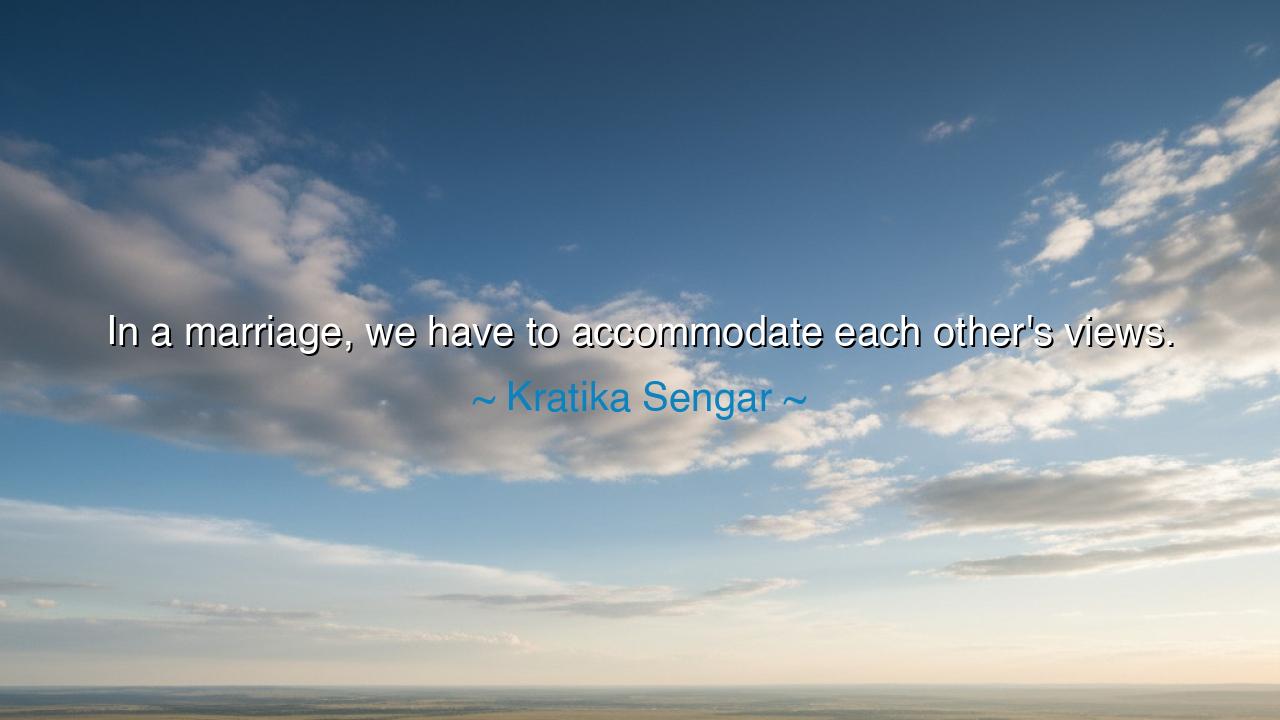
In a marriage, we have to accommodate each other's views.






In the great journey of life, where the forces of love, trust, and unity intertwine, there exists a sacred bond called marriage. It is a partnership not merely of two bodies but of two souls, each with its own desires, beliefs, and dreams. Kratika Sengar's words—"In a marriage, we have to accommodate each other’s views"—speak to the heart of what it means to build a lasting union. These words remind us that a marriage is not about perfect harmony or uniformity but about the delicate balance of embracing the differences between two people while growing together in mutual respect and understanding. Accommodation is not a concession; it is an act of love, a willingness to meet each other halfway, even when the path is not clear.
In the ancient world, marriage was often seen through a lens of duty and tradition, and the individual desires of each partner were sometimes regarded as secondary to societal expectations. Yet, the greatest philosophers understood that true union could only be forged when two individuals came together not only in body but in spirit. Aristotle, in his teachings on friendship and marriage, described the ideal union as one in which two individuals come together not as opposites but as companions who challenge and support each other’s growth. The Philosopher understood that in the balance of marriage, both partners must be willing to accommodate each other’s views, for it is in this mutual respect that true partnership blossoms. To accommodate is not to surrender one’s own identity but to harmonize with another while maintaining individuality—a principle as ancient as the Greek philosophers themselves.
Consider the Roman marriage between Antony and Cleopatra. Their union was not one based solely on political ambition but on a shared vision that allowed for the accommodation of each other’s differences—differences in culture, status, and power. Cleopatra, the queen of Egypt, and Mark Antony, the Roman general, despite their contrasting worlds, found common ground in their shared love and commitment to their people and their political survival. It was through this union—one where both had to accommodate each other’s worldviews—that they were able to exert influence over a vast portion of the ancient world. Their love story, though tragic, is an example of how accommodation of differing views in a marriage can lead to great strength when two individuals join forces, working towards a common cause.
The power of accommodation is not just about coming together in times of harmony, but in the moments of conflict and difference. In our own time, the relationship between Mahatma Gandhi and his wife, Kasturba, exemplified this principle. Gandhi, whose life was dedicated to social and political change, was often at odds with the traditional customs and beliefs of his family, especially regarding women’s roles in society. Yet, Kasturba, through the power of compromise and understanding, stood by him, offering support and strength, even when her own views sometimes differed from his. Their marriage was not without its struggles, but through accommodation and mutual respect, they worked together to fight for freedom and justice, proving that true partnership comes not from perfect alignment but from the willingness to support and embrace each other’s differences.
In our own lives, we must accommodate the views of others, particularly in our closest relationships, for it is in this practice that we build lasting bonds. Just as Kratika Sengar suggests, marriage is not about two people always agreeing or thinking alike. It is about the willingness to listen, to understand, and to respect the other’s perspective. Accommodation does not mean sacrificing one's values but learning how to grow together, adapting to life’s challenges with grace. When we see our partner’s differences not as obstacles but as opportunities to grow, we build a stronger and more fulfilling relationship.
The lesson from Sengar's words is simple but profound: marriage is not a battleground but a shared journey where both partners must be willing to give space to each other’s views, dreams, and desires. True love does not seek to dominate but to coexist, to evolve, and to support one another through both joys and struggles. In every relationship, there will be moments when our views clash, but it is through accommodation—through the act of listening and understanding—that we find the deepest connection and strength.
In our own relationships, we must practice accommodation. We must listen with empathy, speak with respect, and be willing to find common ground, even when the world around us seems divided. True unity comes not from imposing our will but from recognizing the value in each other’s perspectives and building something stronger from that shared understanding. Let us remember that in the sacred union of marriage, it is not only about love but about the sacrifice and growth that occur when two people are willing to accommodate each other’s views, shaping a partnership that lasts through all the trials of life.






AAdministratorAdministrator
Welcome, honored guests. Please leave a comment, we will respond soon